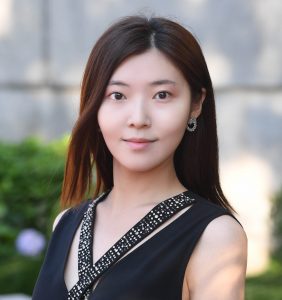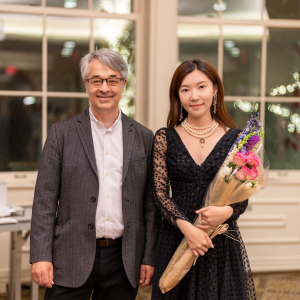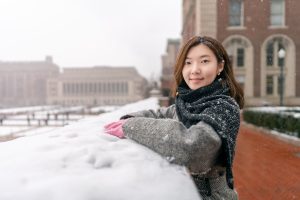 Cindy Kang (2023) pens an essay reflecting on her time in the Econ MAE program and how that led her to pursue a Ph.D. in Economics at Harvard University, where she will study gender inequality and labor economics. She will start her Ph.D. in Fall 2024.
Cindy Kang (2023) pens an essay reflecting on her time in the Econ MAE program and how that led her to pursue a Ph.D. in Economics at Harvard University, where she will study gender inequality and labor economics. She will start her Ph.D. in Fall 2024.
My Reflections:
As a young Chinese woman from Beijing, gender inequality in the Chinese labor market strikes a personal chord with me. The conviction to address gender inequality with sustainable solutions has guided my academic journey, leading me to major in Economics during my undergraduate studies and study Economics for my graduate studies, mainly focusing on labor economics.
I choose labor economics as my academic pursuit because it provides me with the theory and the empirical tools to unravel the complex dynamics of wages, employment, and inequality, which are at the core of most people’s livelihoods. The significant impact of labor economics on human development profoundly inspires me. Years of research and practical solutions within labor economics have empowered women to contribute to economic and social development. To me, this is immensely appealing.
I studied at the Chinese University of Hong Kong, Shenzen. I received an education integrating Eastern and Western perspectives within a research environment that embraces a global outlook and social responsibilities. During my undergraduate years, I conducted research projects centered on marriage because of its profound influence on women’s earnings and job opportunities.
Why Columbia, Why MAE:
During my undergraduate studies, I set my career goal of teaching and conducting cutting-edge research after earning a Ph.D. Columbia University’s Master of Arts seemed like the perfect fit for me to achieve my goals. I vividly remember the excitement and anticipation upon receiving the admission letter from Columbia’s MAE program—a letter symbolizing one and a half years of study and training in a program dedicated to developing leaders who fearlessly address the world’s most complex challenges with advanced applied economic research.
Choosing Columbia’s MAE program for my master’s studies was the best decision I have ever made. Columbia’s MAE program, known for being rigorous and challenging, was what I needed to pursue a PhD program. Upon starting my graduate studies, I discovered that the program met all my expectations and needs and surpassed them in ways I could not have even imagined. Its rigorous and systematic curriculum, high-quality teaching resources, diverse research opportunities, and encouragement of academic innovation all laid a solid foundation for my subsequent academic career, making it an unforgettable experience in my life.
I enjoyed the rigor and systematic nature of the MAE’s courses and the passionate academic atmosphere. The math camp, held before the program began, equipped me with comprehensive and practical mathematical training commonly used in economics. Throughout the subsequent year and a half, I frequently revisited the course materials provided by the TAs during the math camp. The advanced core courses in microeconomics, macroeconomics, and econometrics, along with elective courses, established the core theoretical framework for my economics studies. The problem sets assigned by the instructors were crucial for reinforcing my conceptual understanding. I vividly remember the thrill of solving challenging problems in the assignments, such as those that deepened my comprehension of a microeconomic model. I enjoyed Professor Salanié’s problem sets, finding them intellectually stimulating and “fun,” as they allowed me to “think outside the box.” In addition to the problem sets, the recitation sessions accompanying each lecture aided my grasp of the course material. The summaries of key concepts, problem-solving exercises, and Q&A sessions meticulously prepared by the dedicated and knowledgeable TAs significantly enhance my absorption of new knowledge.

Cindy is here with Professor Bernard Salanié, the Director of the Econ MA program and her instructor for Microeconomics I.
Besides the program’s rigorous and systematic core and elective courses, I am grateful for the outside courses Columbia’s MAE program connected me with, including the summer modern analysis course and the Ph.D.-level labor economics course in the third semester. Both courses were instrumental in my PhD application. Taking the modern analysis course during the summer lightened my academic load during the spring and fall semesters. Offered by the mathematics department, this course provided me with proof-focused mathematical training, essential for my upcoming economics PhD courses and research. I also feel incredibly fortunate to have taken a Ph.D.-level labor economics course taught by Professor Sandra Black during my master’s program’s third semester. During my studies, I was struck by how labor economic theories elucidate the fundamental causes of the gender gap in wages and participation in the labor market. I understood that girls without means for continuing their education are deprived of the right to accumulate human capital and the opportunity to signal their competencies—factors that could ultimately diminish their earning potential in the workforce.
Columbia’s MAE program also allowed me to conduct independent academic research in my area of interest during its third-semester capstone project, with the scholar I admire advising me. Advised by Professor Sandra Black, my master’s thesis allowed me to weave together my passions for labor economics, gender equality, and policy implications. I attributed a portion of China’s gender wage gap to demand-side changes driven by technological advancement. My research revealed that workplace discrimination against women predates even the emergence of cutting-edge technologies like industrial robots. The underrepresentation of women in prestigious occupations hinders their ability to benefit from the new opportunities created by such innovations. Consequently, deep-rooted structural gender inequality persists, exacerbated by technological progress. Policymakers must confront and address the systemic discrimination against women in elite positions. These experiences reaffirmed my belief that I can use labor economics to understand and combat gender inequality.
Columbia’s MAE program also provides valuable research assistant opportunities. I was awarded the PER Summer Research Assistant Fellowship and served as a research assistant for Professor Michael Woodford on his “Endogenously Imprecise Decision Making” project. In this project, I assisted with computational modeling to track the evolution of probability beliefs in response to a continuous stream of evidence. This experience offered me profound insights into how leading economists challenge and reshape the conventional paradigms of economic rationality by delving into situations where individuals often operate with limited information and make imprecise decisions that systematically diverge from the predictions of Bayesian inference.
Columbia University is nestled in New York City, a vibrant international metropolis. Its inclusivity and multicultural environment draw talents from across the world, something I find particularly attractive as an international student. As an international student, the Columbia MAE program offered me a welcoming multicultural environment and a feeling of “belonging.” My spoken English and academic writing have improved significantly in this program, enhancing my overall experience. Lastly, I also want to extend my gratitude to the warm cohorts in the MA program. I hold dear the memories of our picnics in Central Park, playing frisbee, and singing songs on guitars.

Cindy enjoying one of the picturesque snowfalls on Columbia University’s beautiful campus.
What’s next?
For me, Columbia’s MAE embodies the essence of Columbia’s motto, “In Lumine Tuo Videbimus Lumen,” meaning “In Thy Light Shall We See Light.” With the support of all the resources provided by Columbia’s MAE program, I have received and accepted an offer from Harvard University’s Economics Ph.D. program. Thanks to the opportunities presented at Columbia University, I am deeply committed to conducting research that contributes to societal well-being, fully aware of the incredible resources at my disposal.
I am motivated by a higher calling: In a world where the economy forms the foundation of human existence, its growth and equitable distribution profoundly affect the welfare of billions of people. Economics provides me with the means to decode the intricacies of economic growth and resource allocation, offering pathways toward sustainable solutions for eradicating structural poverty and social inequality. I will devote my lifelong care, passion, and ever-expanding perspective and capabilities to economics.
To current and prospective students, I encourage you to dedicate yourselves to your studies and grasp every opportunity that comes your way. This program has the power to turn your dreams into reality.
By Cindy Kang
Edited by Gabrielle Okun

